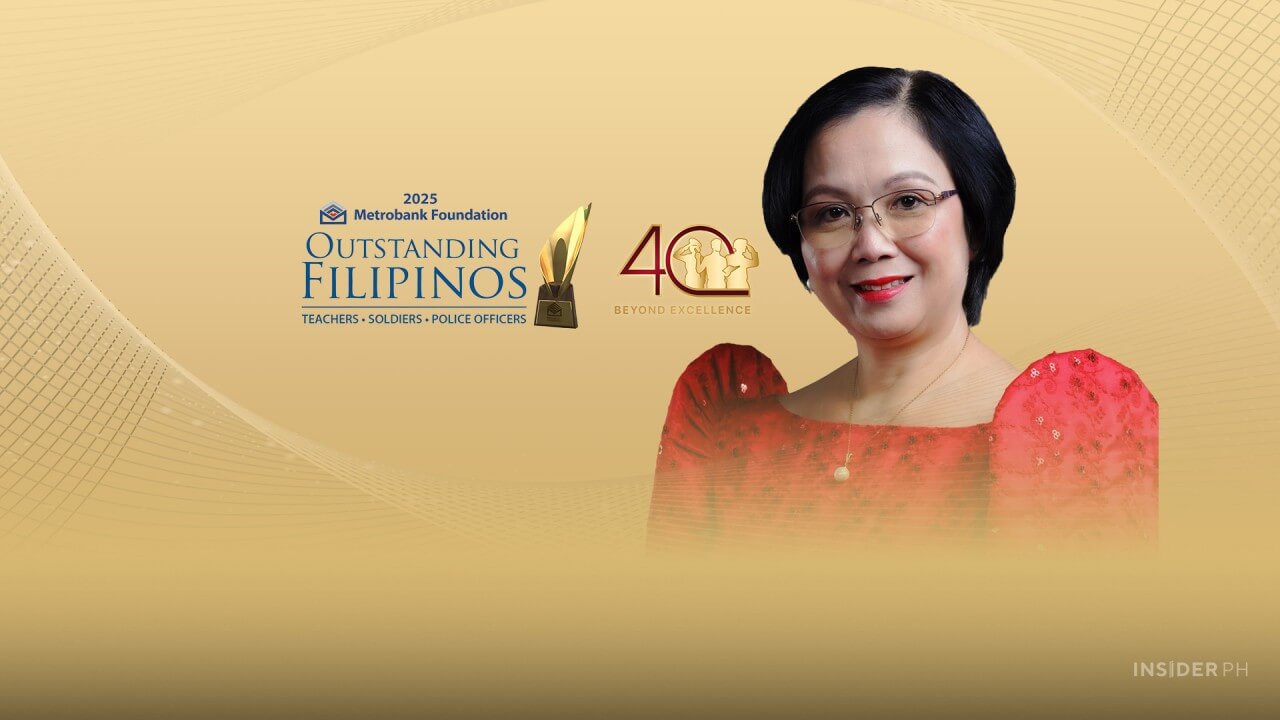

InsiderPH features the inspiring stories of Metrobank Foundation’s awardees as Outstanding Filipinos for 2025—teachers, soldiers and police officers who are making significant contributions to nation building.
Glassware, when it wasn’t missing, was chipped at the edges. The floors bore the stains of old experiments. There were too few faculty members to mount a serious research program, and fewer still who believed they could.
Choosing to stay
It was in this environment, in 1993, that Professor Mylene M. Uy arrived. She had not set out to be an academic. “I applied, driven not by long-term plans, but by the immediate need for work,” she wrote. “What began as a temporary decision became a lifelong vocation.”
She was young then, just two years out of college and a newly licensed chemist. She inherited a desk, a syllabus, and a department whose aspirations were kept private, like something that might spoil if spoken aloud. Research was a luxury. Graduate programs were still mostly rumors. Ambition was something that required discretion.
She could have left as what others did, but Dr. Uy stayed.
Thirty-one years later, she is not only a senior member of the university faculty, but one of the country’s foremost advocates for science education and equitable innovation. She has trained over 90 researchers, helped establish the region’s first graduate chemistry programs, and built, from almost nothing, a pipeline for Filipino scientists, especially those from underserved provinces.
Teaching and learning against all odds
“There is no greater joy than seeing [students] evolve into confident scientists, dedicated educators, and leaders in their own right,” she says. “Especially those who come from underserved communities.”
She taught through brownouts and a shoestring budget, mentored students who queued to borrow a single textbook, and scribbled lecture notes on the backs of used printouts. In the early 2000s, she earned a Monbusho scholarship and left for Japan to pursue her doctorate degree, a chapter that nearly didn’t happen.
"Leaving my two-year-old twin sons behind was one of the hardest decisions I’ve ever made,” she recalls. “I had to navigate loneliness, cultural adjustments, and the rigorous demands of academic life all at once.”
But she returned in 2005, newly credentialed, quietly determined, and with a conviction that Mindanao deserved more.
Dr. Uy began, as administrators often do, with memos. She rewrote the policies. She restructured the programs. She knocked on doors.
Doors eventually opened. Support arrived from the Commission on Higher Education, then from the Department of Science and Technology. Glassware was replaced. Scholarships came. Laboratories revived. And students, many of them first-generation scientists, began to fill the rooms. Eight of them now teach alongside her, in the same corridors where they once took notes as students.
Science that serves and protects
In 2017, Dr. Uy helped establish the region’s first Tuklas Lunas Development Center, pioneering natural products research in Mindanao. “We traced the pharmacological secrets of medicinal plants used by the Maranao, Subanen, and Mamanwa healers,” she says.
Her team has identified 19 promising drug leads. They filed multiple patents not for profit, but to safeguard ownership of indigenous knowledge that has belonged, always, to the people.
“It is science that serves,” she says, “and science that protects.”
In schools in underserved communities, Dr. Uy’s name is spoken with reverence. She trains teachers who have never set foot in a lab. She coaches students in remote schools, explaining drug discoveries in local dialects. She teaches the value of the pechay in one’s backyard, the compound in a grandmother’s herbal tea.
A life’s mission
“Teaching has given me more than a career; it has given me a mission,” she said. “To teach, to do research, to serve: this is not only my profession, but my purpose and passion.”
And it shows, in the ripple effect she has painstakingly led. Students who once doubted their own intelligence now lead labs, teach at universities, and mentor new generations.
“Every time a former student publishes research, leads a classroom, or mentors others,” she says, “I feel the quiet affirmation that my efforts have made a lasting difference.”
A lasting difference
Though she still has a decade before retirement, her legacy is already visible. It is in the scientists who once sat in her classes. It is in the drug discovery infrastructure of an island that once had none. It is in the teachers who now train others. And in the child who will take medicine one day, never knowing the chemist who made it possible.
Dr. Uy will likely say she was only doing her job. But what she did was build a laboratory in the dark. And then, she taught others how to turn on the light. —Metrobank Foundation